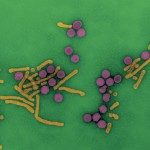Lien vers Pubmed [PMID] – 21775455
J. Virol. 2011 Oct;85(19):10201-12
Plasmid DNA vaccines serve in a wide array of applications ranging from prophylactic vaccines to potential therapeutic tools against infectious diseases and cancer. In this study, we analyzed the mechanisms underlying the activation of natural killer (NK) cells and their potential role in adaptive immunity during DNA-based immunization against hepatitis B virus surface antigen in mice. We observed that the mature Mac-1(+) CD27(-) NK cell subset increased in the liver of mice early after DNA injection, whereas the number of the less mature Mac-1(+) CD27(+) NK cells in the liver and spleen was significantly reduced. This effect was attributed to bacterial sequences present in the plasmid backbone rather than to the encoded antigen and was not observed in immunized MyD88-deficient mice. The activation of NK cells by plasmid-DNA injection was associated with an increase in their effector functions that depended on the expressed antigen. Maturation of NK cells was abrogated in the absence of T cells, suggesting that cross talk exists between NK cells and antigen-specific T cells. Taken together, our data unravel the mechanics of plasmid vector-induced maturation of NK cells and plasmid-encoded antigen-dependent activation of NK cells required for a crucial role of NK cells in DNA vaccine-induced immunogenicity.

